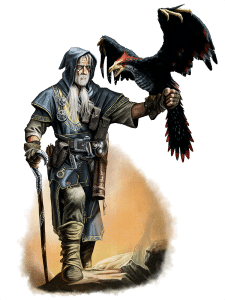Perhaps the most famous character from Dungeons and Dragons novels is the drow ranger Drizzt. Drizzt is known for being the good-hearted character that goes against the evil duplicitousness of his kin.
Drizzt is also known for for having an animal companion, Guenhwyvar, a black panther who resides on the astral plane, but can be called to the material plane via an onyx figurine.
Wizards in D&D are likewise known for their animal companions. There are skills in D&D like lock picking and wielding martial weapons. But there is also the ability to summon animals to fight for you, or to take one as a familiar.
Those spell abilities interact with animals in a way that doesn’t normally consider the consent of the animal. So is it wrong to summon an animal to fight by your side? Imagine the flawless white unicorn, and wonder if it has desires of its own. What are the ethics of controlling it?
Wizards interact with animals typically via domination spells. This can happen in a couple ways:
- They can summon animals to fight for them
- Or they can call an animal to be their familiar, meaning it becomes a magical beast in the service or the sorcerer.
Suppose a wizard summons two toads. These two little croakers were presumably doing other things when the wizard called them on their cell phones. Maybe the toads were hopping lily pad to lily pad or maybe they were busy catching flies. We don’t know. But is it right for the wizard to call them away from their toady tasks?
Bernard Rollin is a contemporary philosopher who specializes in the ethics of how we treat animals. Dr. Rollin argues that as long as we have been domesticating animals, we have had a social consensus regarding the treatment of animals. Basically, this ethic forbids unnecessary, deliberate cruelty toward animals.
Guess what? This ethic has been written about as far back as early Biblical times, as early as the book of Deuteronomy in the Bible. It is written that “You shall not plow with an ox and a donkey yoked together” (Deuteronomy 22:10).
So…that’s an odd verse, is it not? But understanding the context from which is is written, we know that the reason behind this was to lessen the suffering of animals, as an ox is much stronger than a donkey. So the mismatch in strength would make the act of plowing painful for both animals.
Another Bible passage says that only a sharp knife should be used for the butchering of animals. Why? Because a sharp knife makes death quicker, lessening the pain for the animal.
Did you know that animal ethics went back as far as the Bible? If not, then you’ve just been Sunday schooled!

So back to our wizard: calling the toads into combat and taking them away from their tasks could be understood as causing the animals unnecessary suffering, so, therefore, would be wrong. And don’t even get us started if the toads died trying to save the wizard’s life.
But what about familiars? In this case, the wizard grants special abilities to the animals and develops a long-term relationship with them. Let’s imagine the mage takes a hawk as a familiar that just prior to the magical summoning had a mate which had chicks. The wizard may have caused suffering to an entire family of animals.
Even the Greek Aristotle would concur with this, as he’d say the wizard’s actions are unethical because, through turning the familiar into a magical beast, the wizard is not respecting the animal’s needs and desires.
Of course, if your character is of evil alignment, they’d likely be the type to kick puppies anyway, so they may ignore or even delight in knowing his actions would be considered wrong toward animals.
But why are we talking about ethics and the treatment of animals in regards to a game? It’s like I’m trying to kill fun here, man.
I get that. I wonder if nerds like me were no longer allowed to write articles about trivial little details, would the internet deflate like a balloon? And if that happened would it make that silly squeaking sound or would it be more of a PPPPBBBBBBLLLLLLLUUUUUUUUPPPPPP as it flew wildly around the room?
D&D is a game, and games are meant to be fun. So please don’t be the guy at the table to stops the game cold to scold the wizard when he summons a celestial dolphin to fight at his side. We’re just having fun with a little thought experiment here.

Let’s close this out by going back to Drizzt and Guenhwyvar. What of a ranger who can befriend animals or a druid who treats animals with reverence? Contrary to the actions of a wizard, who uses the power of magic to force compliance toward their will, rangers befriend. And druids, who speak the language of the animals, would call them only when needed, and it is presumed the animals come willingly.
So there seems to be a big difference between befriending animals and magically forcing them to fight by your side. I mean, I would think so. But I’m not an animal ethics philosopher like Bernard Rollin, nor for that matter, Moses, the writer of the book of Deuteronomy, so what do I know?
What we pretend to do in D&D is one thing; it’s what we do in real life that matters. So what do you say we not go around kicking puppies. And while we are at it, let’s spare a thought for the poor little toads as well.

